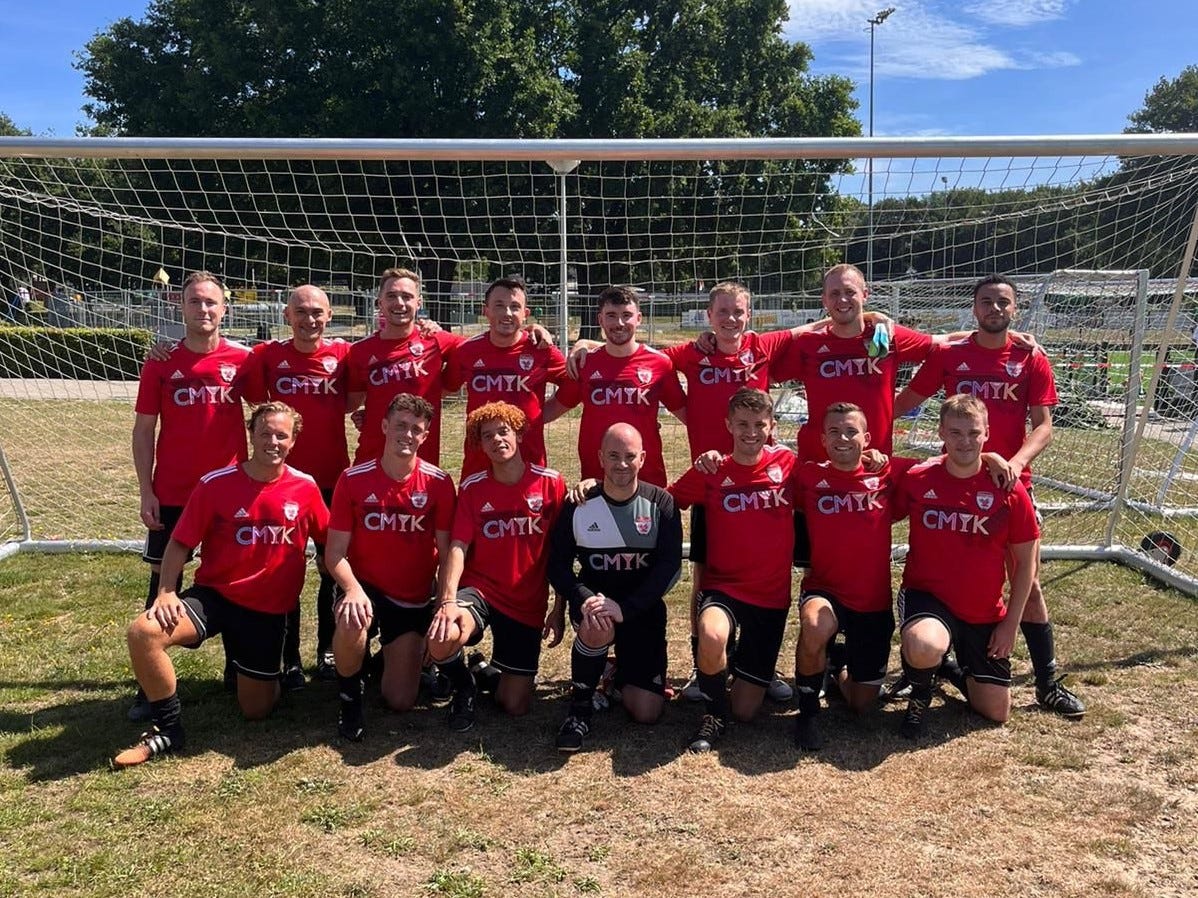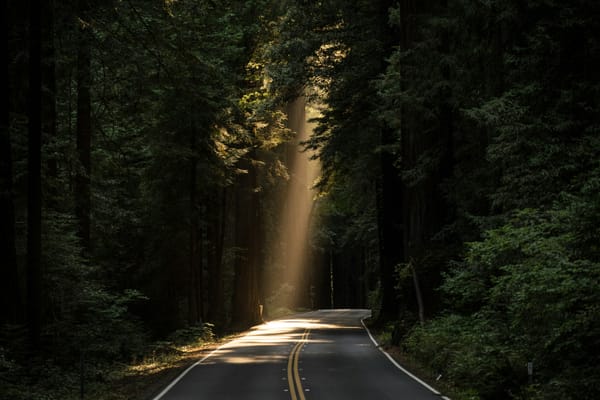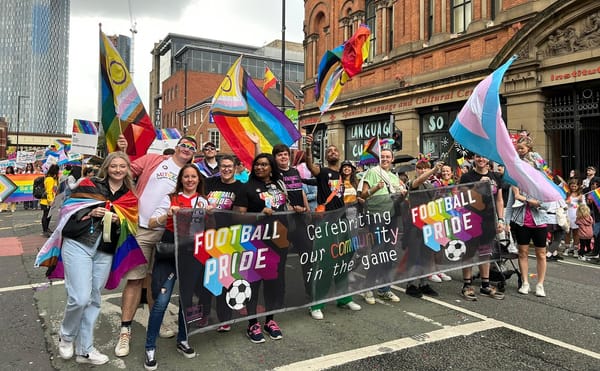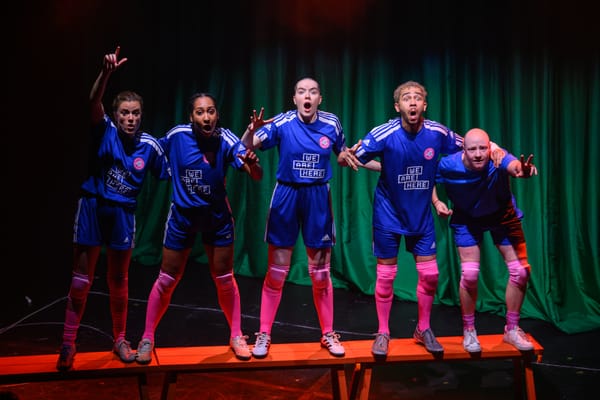Growing up, football made me ashamed of my sexuality. Now, it empowers me.
How finding an inclusive football team transformed Chris's life
When football is inclusive, it changes lives. When it's not, it hurts people, it forces people to hide their identity, it creates shame. This week, Chris tells his story. It demonstrates the power of inclusive football to make someone feel whole.
By Chris Threadgold
It was around the age of 13 – just as I was figuring out I was probably gay – that I confronted blatant homophobia at football for the first time. At a new local team where I grew up in rural Cambridgeshire and playing up an age group, I took a heavy late challenge from a teammate in training and went flying. The whistle went, free kick to me.
“Why did you go down like a poof?” “Yeah, that's a bit gay mate.”
I turned around to see two teammates calling me out for what they thought was a soft free kick. I’m sure that – to them – that comment was just harmless ‘banter’, but I remember being hurt by those words far more than any tackle or challenge. What did being gay have to do with it (not that they’d have known I was anyway given I wasn’t anywhere near out) and why did they choose to use that as an insult?
Across other grassroots football teams I played at and well into adult football, that comment was a regular fixture and anyone could be on the receiving end. Coaches allowed it to go unchallenged, and even joined in on the anti-gay ‘banter’ pile-on. It created a series of hostile environments that impressed upon me this belief that I didn’t belong there because I was gay. How was I supposed to feel comfortable enough to come out to my friends and teammates in an environment like that? Every time I played football, I felt overwhelmingly ashamed to be gay and hid deeper in the closet, wishing I could be straight so I could belong.
I’m reluctant to say I gave up football totally while in the closet in my early 20s – a combination of injuries and lockdowns reduced my chances to play to very little anyway – but when I did manage to play, I didn’t enjoy it because of how my football experiences had made me feel about myself. In truth, it was only the disappointment of letting down my mates who’d struggle to find the numbers without me that made me turn up each week.
Shortly before moving to London as lockdown restrictions ended in Summer 2021, I came out to friends and family. My decision to do so was, in hindsight, motivated by feeling better about myself and my sexuality through not having played much football recently and spending time away from the environments that had become problematic. But when I moved, I desperately missed playing football yet I didn’t feel like I could join a new team as an out gay player; I feared walking into another hostile anti-gay environment and the possibility of repeating the experiences I had had growing up.
LGBT+ inclusive football teams were barely on my radar and it was by luck rather than by design that I came across them in London for the first time: in a Brixton pub with a first date who mentioned his team, London Falcons. I really missed playing football and was so excited at the chance to get playing again as part of a dedicated LGBT+ inclusive team when he suggested I try out at training. The experience of my first Falcons sessions were unlike any other previous ones I’ve had: there was genuine inclusion – no homophobic comments, each and every player fully expressing themselves, people going out of their way to get to know me and making sure I was enjoying it. From the first whistle, to borrow a football metaphor, I really felt comfortable being myself around this group. It was perfect.
July quickly came around and Pride in London was on the horizon. I’d never been to a Pride before because the feeling I had about my sexuality wasn’t pride, it was shame. I went along with the Falcons, as a chance for me to get to know a lot of the team better and to celebrate who we are in the heart of London. Being there surrounded by these new mates – all of them just like me: LGBT+ and football-loving – showed me that I did belong. I was finally closing the door on that relentless sense of shame that had been the backing track to my years in the closet.

It blows my mind that I’m still in my first season at the club. Less than a year ago I didn’t think I wanted to play football again and it’s now the highlight of my week. When training ends on Wednesday nights, I count down the days to Saturday’s match – and when that ends I’ll count down the days to training. But it’s so much more than just a few hours of exercise a couple of times a week – Falcons have given me so much on and off the pitch.
On the pitch, I’ve already had the chance to play in Europe in the 2022 EuroGames in the Netherlands, where we picked up a bronze medal, and I’m looking forward to playing in the 2023 edition in Switzerland this summer as well as other LGBT+ clubs throughout the UK in different tournaments organised by the Gay Football Supporters’ Network (GFSN).
But off the pitch is where the Falcons have had the biggest impact. I no longer feel ashamed of who I am and I have found self-confidence and my voice. I now lead initiatives to help drive LGBT+ inclusion and opportunity at work and I’ve spoken out in the national press about the England OneLove armband scandal at the Qatar World Cup this winter. These are things I’d have never done without the confidence I’ve got from my experience with the Falcons.
Growing up, football made me ashamed of my sexuality but finding LGBT+ football has had a transformative impact on my life. It has given me the strong sense of belonging that the younger me was desperately searching for and I am so grateful.
Like what you’ve read? Share Chris’s story.


